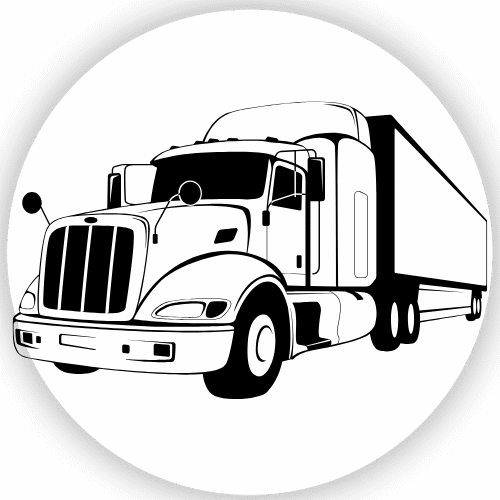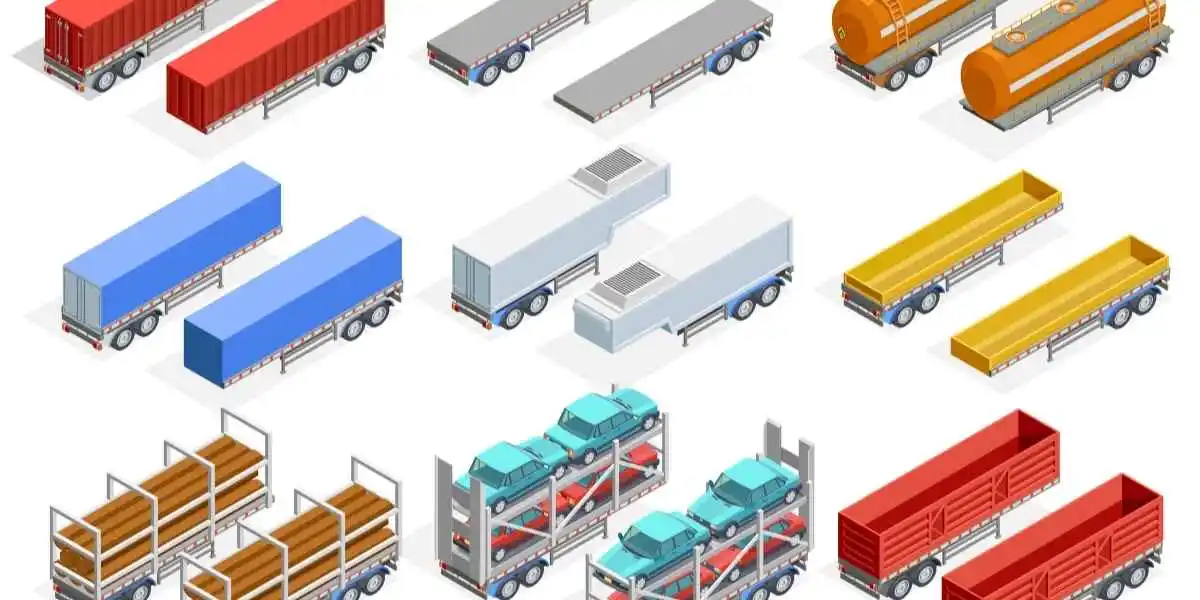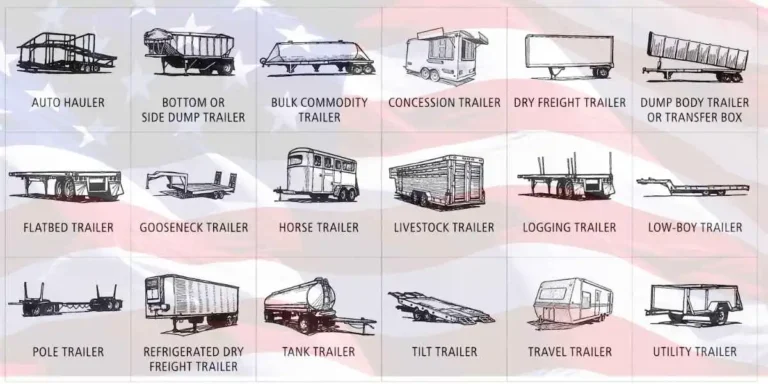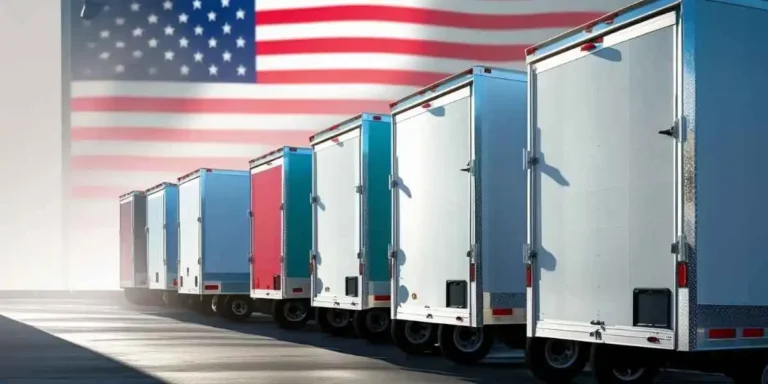Utility Trailers Types, Uses & Buying Tips 2025
Utility trailers are an essential tool for homeowners, businesses, and enthusiasts alike. Whether you’re hauling garden supplies, construction equipment, or recreational vehicles, the right utility trailer can make all the difference. But with so many options available, how do you know which one suits your needs?
In this bog, we’ll explore the different types of utility trailers, their uses, tips for selecting the right one, maintenance tips, and legal requirements all tailored to help you make an informed decision when buying your next trailer.
Common Types of Utility Trailers
There are several types of utility trailers available, each suited for specific tasks. Let’s take a look at the most common ones:
Open Utility Trailers
Open trailers are the most basic form of utility trailers. They usually come with a flatbed and low side rails or no sides at all. They are best used for landscaping, construction work, and hauling larger items that don’t require protection from the elements.
Pros:
Cost-effective
Easy to load and unload
Lightweight and easy to tow
Cons:
Cargo is exposed to weather and theft
Enclosed Utility Trailers
Enclosed trailers have fully enclosed sides and a roof, providing extra protection for the cargo inside. These trailers are ideal for tool transportation, moving goods, or anything that needs to be kept safe from the weather.
Pros:
Protects cargo from weather
Increased security for valuable items
Cons:
Heavier and more expensive than open trailers
Dump Trailers
Dump trailers are commonly used in construction or for hauling loose materials like dirt, gravel, or debris. These trailers are equipped with a hydraulic lift to easily dump the contents.
Pros:
Heavy-duty capacity for bulk materials
Hydraulic dumping system for easy unloading
Cons:
Expensive
Requires more maintenance
Equipment Trailers
Heavy-duty equipment trailers are designed for transporting large machinery like skid steers, tractors, or backhoes. These trailers often feature ramps for easy loading.
Pros:
Can carry heavy machinery
Durable construction
Cons:
Bulky and expensive
Car Haulers
Car haulers are designed for vehicle transportation. These trailers often come with ramps to load and unload vehicles safely and are perfect for moving cars or motorcycles.
Pros:
Safe transport of vehicles
Flatbed design for easy loading/unloading
Cons:
Larger and harder to maneuver
Top Uses for Utility Trailers
Utility trailers are versatile and have various uses across different industries. Here are the most common ways they are put to use:
For Homeowners & DIYers
Utility trailers are perfect for moving large items around the house or yard. Whether it’s carrying garden supplies, moving furniture, or hauling yard debris, utility trailers make these tasks easier and more efficient.
For Contractors & Landscapers
Contractors and landscapers often rely on utility trailers to carry tools, mowers, and other equipment. Their ability to haul large, heavy loads while being easy to tow makes them a popular choice for businesses that require frequent transportation.
For Recreational Purposes
Utility trailers are often used for hauling ATVs, motorcycles, or camping gear. Whether you’re going off-road or on a road trip, these trailers help you transport all your recreational gear safely.
For Farms & Ranches
Farmers and ranchers use utility trailers to transport feed, fencing, and small machinery. These trailers are invaluable for daily operations on a farm or ranch.
How to Choose the Right Utility Trailer
Choosing the right utility trailer depends on several factors, including what you plan to haul and the capacity of your towing vehicle.
Consider the Size You Need
Utility trailers come in various sizes, from compact 4×6 trailers to large 8.5×20-foot models. The size you need depends on the type of cargo you plan to transport. For example, a small 5×8 trailer might be sufficient for landscaping, while a larger 7×16 trailer is better for hauling equipment or furniture.
Weight Rating & Axles
Understanding the GVWR (Gross Vehicle Weight Rating) is essential when selecting a trailer. GVWR tells you the maximum weight a trailer can carry. You’ll also need to decide between a single axle or tandem axle trailer, depending on the load and stability you require.
Open vs. Enclosed
Consider whether your cargo needs protection from the weather or theft. If not, an open utility trailer might be ideal. For high-value or sensitive equipment, an enclosed trailer is the better choice.
Tow Vehicle Compatibility
Before buying, ensure your towing vehicle is capable of handling the weight of the trailer. Check your vehicle’s towing capacity and match it with the trailer’s weight and size.
Legal Requirements and Safety Tips
Before you start towing a utility trailer, make sure you understand the legal requirements.
Do You Need to Register a Utility Trailer?
In most states, utility trailers need to be registered, and some require specific license plates. Be sure to check your state’s regulations to ensure you’re in compliance.
Trailer Brakes, Lights, and Inspections
For trailers over a certain weight, you may need to install brakes. Additionally, it’s essential to check that your tail lights and brake lights are working, as well as ensuring your trailer is properly inspected.
Driving & Safety Best Practices
When towing, always ensure your load is evenly distributed and secured. Additionally, use safety chains and check your reflectors for visibility.
Utility Trailer Maintenance Tips
Proper maintenance will extend the life of your utility trailer. Here are some quick maintenance tips:
Regularly check tire pressure and tread wear.
Grease wheel bearings and inspect the axle.
Test your trailer’s lights and wiring every few months.
Store your trailer in a dry, covered location to avoid rust.
Where to Buy Utility Trailers in the USA
Top Brands and Manufacturers
Some of the best-known brands for utility trailers include Big Tex, Carry-On, and Load Trail. These manufacturers offer trailers for various purposes, from landscaping to heavy equipment hauling.
Buying New vs. Used
Buying a new utility trailer provides peace of mind and warranty protection. However, used trailers can be a more affordable option if inspected properly for damage.
Online Retailers and Local Dealers
You can purchase utility trailers from local dealerships or online retailers like Tractor Supply Co. or Home Depot. Always check the trailer in person if possible before buying.
FAQs About Utility Trailers
What size utility trailer do I need?
It depends on what you plan to haul, but most people opt for a 5×8 or 6×12 trailer for everyday use.
Can I finance a utility trailer?
Yes, many dealerships offer financing options for utility trailers.
Do I need a special license to tow a trailer?
In most states, you don’t need a special license, but make sure your vehicle and trailer are within weight limits.
What’s the lifespan of a well-maintained trailer?
With proper care, a utility trailer can last 10–15 years.



